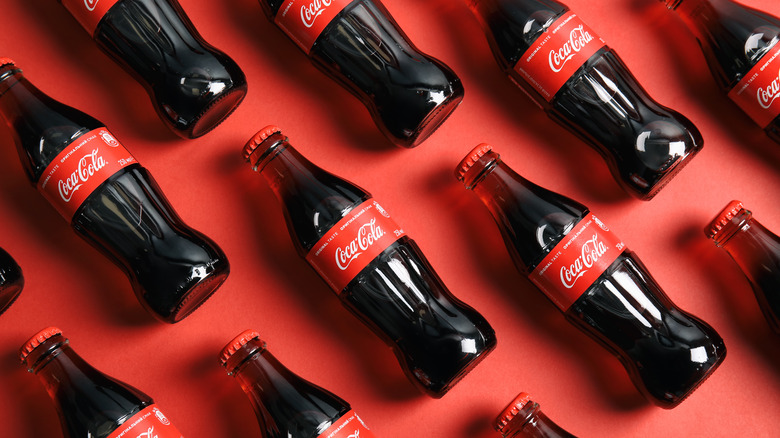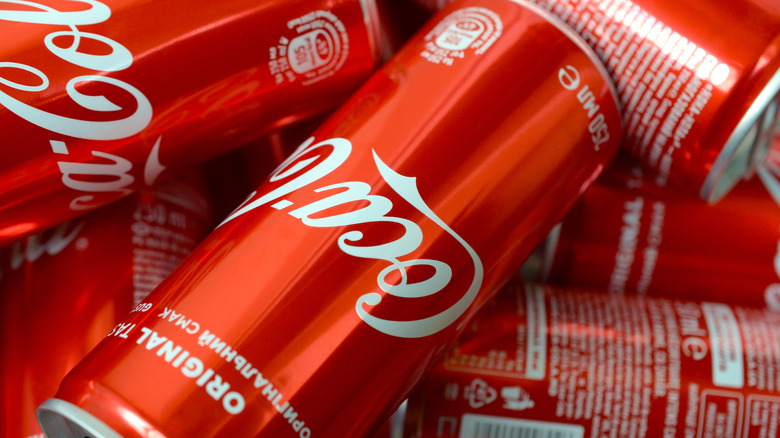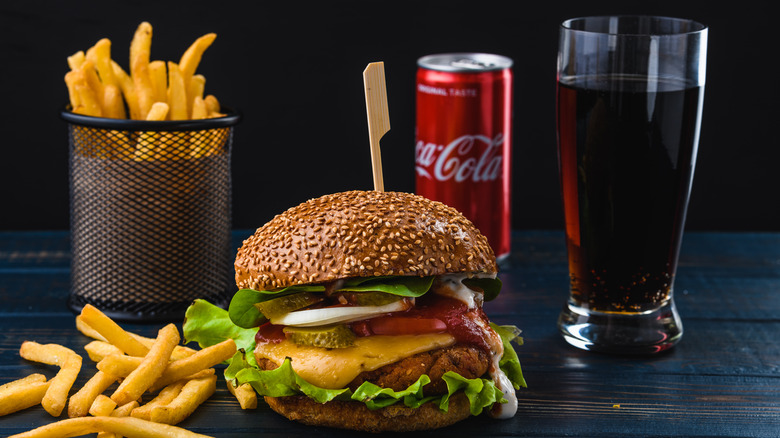Coca-Cola Doesn't Do Business In These Two Countries
Coca-Cola is, at its most basic, a famous brand of soda. It's something that comes in a glass bottle or an aluminum can and is pretty much just carbonated sugar water. But for a simple can of soda, Coca-Cola is a bonafide symbol of the power of marketing — and for some, an example of extreme American influence in foreign countries.
From humble origins as a "health tonic" being sold in a pharmacy in Georgia in 1886, Coca-Cola's influence on the American people has been felt for over a century, per the Library of Congress. It's even helped shape some of the world's most beloved characters, like the modern-day depiction of Santa Claus (or that's what Coca-Cola tells us, at least). In 2021, Coca-Cola dropped an astounding $4.1 billion on advertising alone (via Statista) — something that makes perfect sense if you count Super Bowl commercials, radio advertisements, collaborations, and social media promotions. In short, the American institution we call Coca-Cola has both refreshed and influenced countless Americans for generations.
However, the U.S. isn't the only country in which Coca-Cola as a company operates. For instance, the American soda company has a powerful grip over millions of young individuals in China, per The Drum. According to The New York Times, Coca-Cola has also found a market in Germany dating back to the 1990s, and even further than that –to a rather controversial era during the Nazi regime (via Atlas Obscura). But there are two countries where Coke's incredible marketing power does not reach.
You can't find Coke in Cuba or North Korea
Whether it's your hometown diner in America or a restaurant in Manchester in the U.K., Coca-Cola may be on the menu more likely than not. But if you were to travel to Cuba or North Korea, chances are that you're probably not getting any kind of Coca-Cola. Why is that? Could it be a history of anti-American or anti-capitalist sentiments between the United States and these two countries?
According to the BBC, Coca-Cola isn't sold in Cuba or North Korea because of trade embargos against both of the countries — North Korea has had an embargo since 1950, and Cuba since 1962. When it comes to the latter, Coca-Cola previously marketed and bottled its products in Cuba, but later abandoned the country after the rise of Fidel Castro and the dictator's ensuing seizure of private assets. But just because you can't get Coke over in Cuba or North Korea doesn't mean there isn't a demand for it.
As the Associated Press reports, it's not too uncommon to find Coca-Cola that's been bottled in China and sold in high-end North Korean businesses. If one couldn't afford the high prices of a can of Coke, other "bootleg" products exist, which supposedly taste very similar to your average can of Coke. While one could theoretically make a profit selling "genuine" Coca-Cola in North Korea or Cuba in the same style as bootleggers in the 1920s, perhaps it's best not to shake the proverbial soda can of international tensions.
Not every country agrees with Coca-Cola on their turf
While Cuba and North Korea are controversial in their own right, this isn't to say they are the only countries that aren't exactly singing the praises of Coca-Cola. Some countries view the introduction of Coca-Cola into their markets as a sign of "Americanization" and have taken a stand against it to preserve their national culture.
Take, for example, France. Well-known for its high opinions on food and drink, the French culture seemed to be taken aback, to put it mildly, by the introduction of Coca-Cola into its markets following World War II. As one scholarly article explains it (via JSTOR), Coke stood out to certain members of French society, such as members of the French Communist party. To them, the soda represented an invasion spurred by American culture that threatened to compromise France's own culture. Some critics lambasted Coca-Cola, viewing it as "poison" and an example of America viewing itself as the "master" to a subservient France.
Coke isn't the only American staple the French have turned their noses at. French-English newspaper The Local reports that French society has a strange "love-hate" relationship with McDonald's, viewing it as a joke to the world of fine dining and cuisine, but at the same time enjoying the variety and convenience offered by a "McDo." While France may have a point about American companies imposing on their culture (how would you like it if a French company started setting up shop all over the United States?), it's simply a byproduct of modern globalization.


